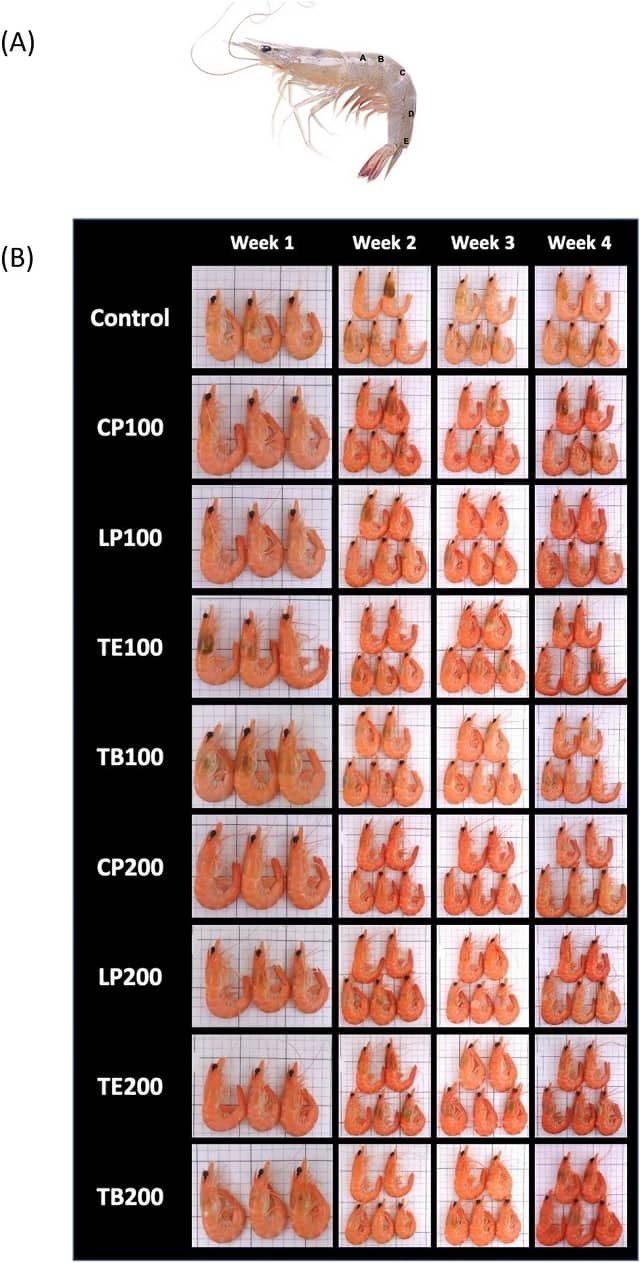
An Innovative Study Reveals the Potential of Taurine, a Natural Amino Acid, to Significantly Improve Reproductive Performance and Overall Health in Penaeus vannamei Shrimp.
The study, published in the journal Aquaculture Nutrition and conducted by a team of scientists from the Iranian Fisheries Science Research Institute (IFSRI), Persian Gulf University, and Urmia University, aimed to investigate the effects of graded levels of taurine on ovarian maturation and physiological responses in female broodstock of the white shrimp P. vannamei.
Taurine: A Versatile Nutrient
While extensive research has been conducted on essential amino acids (EAAs) and their impact on shrimp reproduction, the role of conditionally essential amino acids like taurine (Tau) remains relatively unexplored.
Taurine, a sulfur-containing amino acid, is vital for several physiological processes in aquatic organisms, including digestion, osmoregulation, and antioxidant defense.
Recent studies have highlighted its potential to enhance reproductive performance in fish species; similarly, dietary taurine supplementation can provide several benefits to broodstock shrimp:
- Enhanced Vitellogenesis: Taurine may stimulate the production of yolk proteins, which are essential for egg development and maturation.
- Improved Egg Quality: By increasing taurine concentrations in the egg amino acid pool, dietary taurine can contribute to the development of high-quality eggs with greater resistance to oxidative stress.
- Increased Germ Cell Protection: Taurine’s antioxidant properties can help protect germ cells from oxidative damage, ensuring optimal reproductive function.
- Synergistic Effects with Sex Steroids: Taurine may amplify the effects of sex steroids in gametogenesis, further promoting reproductive success.
However, its specific effects on shrimp reproduction are still under investigation.
Taurine and Shrimp Reproduction
To address this knowledge gap, the research focuses on exploring the influence of dietary taurine on the reproductive performance of female P. vannamei broodstock. By examining factors such as fecundity, fertilization rate, hatching rate, and larval quality, the researchers determined optimal dietary taurine levels to maximize shrimp reproductive performance.
The researchers used a total of 180 broodstock shrimp, divided into six groups, each receiving a basal diet with different Tau levels (0, 2, 4, 6, 8, and 10 g kg−1).
Key Findings
- Accelerated Spawning: Shrimp fed diets containing 4 to 8 grams of taurine per kilogram of feed experienced a shorter latency period post-eyestalk ablation, leading to earlier spawning.
- Enhanced Hepatopancreas and Gonadal Development: Taurine supplementation resulted in increased hepatopancreatic and gonadosomatic indices, indicating better organ function and reproductive health.
- Improved Antioxidant Capacity: Higher taurine levels (6-10 grams per kilogram) elevated the activities of antioxidant enzymes such as glutathione peroxidase, catalase, and superoxide dismutase in the hepatopancreas. This improved antioxidant capacity protects shrimp from oxidative stress.
- Enhanced Lipid Metabolism: Taurine supplementation increased bile salt-dependent lipase activity in the intestine, facilitating lipid digestion and absorption.
- Optimized Nutritional Profile: Dietary taurine led to elevated levels of docosahexaenoic acid (DHA) and taurine in the ovaries, essential nutrients for egg development and embryo viability.
- Strengthened Immune System: Taurine increased the expression of genes involved in immune function, including vitellogenin, insulin-like growth factor II, superoxide dismutase, prophenoloxidase, and lysozyme. This enhanced immune response helps shrimp combat diseases and infections.
Implications for Shrimp Farming
The findings of this study suggest that Tau in a diet of 4-8 g kg−1 can improve maturation and health status in P. vannamei broodstock by modulating lipid metabolism, antioxidant capacity, and immunocompetence.
Stay Always Informed
Join our communities to instantly receive the most important news, reports, and analysis from the aquaculture industry.
These results have significant implications for the shrimp farming industry, providing a potential tool to optimize the nutritional management of farmed shrimp and improve their overall well-being.
Conclusion
In conclusion, this study highlights the potential benefits of dietary taurine supplementation to enhance ovarian maturation and physiological responses in female P. vannamei broodstock.
However, further research is needed to fully understand the underlying mechanisms of these effects and explore the practical applications of taurine supplementation in commercial shrimp farming operations.
The study was funded by the Iran National Science Foundation (INFS).
Contact
Mansour Torfi Mozanzadeh
South Iran Aquaculture Research Centre, Iranian Fisheries Science Research Institute (IFSRI), Agricultural Research Education and Extension (AREEO)
Ahwaz, Iran
Email: mansour.torfi@gmail.com
Reference (open access)
Mozanzadeh, M. T., Bahabadi, M. N., Morshedi, V., Oujifard, A., Agh, N., Ghasemi, A., Maneii, K., Ebrahimi, H., Hamedi, S., & Tamadoni, R. (2024). Effects of Dietary Taurine on Maturation Indices, Antioxidant Capacity, Ovaries Amino and Fatty Acids Profile, and Vitellogenin Gene Transcription Level in Penaeus vannamei Female Brooders. Aquaculture Nutrition, 2024(1), 5532545. https://doi.org/10.1155/2024/5532545
Editor at the digital magazine AquaHoy. He holds a degree in Aquaculture Biology from the National University of Santa (UNS) and a Master’s degree in Science and Innovation Management from the Polytechnic University of Valencia, with postgraduate diplomas in Business Innovation and Innovation Management. He possesses extensive experience in the aquaculture and fisheries sector, having led the Fisheries Innovation Unit of the National Program for Innovation in Fisheries and Aquaculture (PNIPA). He has served as a senior consultant in technology watch, an innovation project formulator and advisor, and a lecturer at UNS. He is a member of the Peruvian College of Biologists and was recognized by the World Aquaculture Society (WAS) in 2016 for his contribution to aquaculture.







